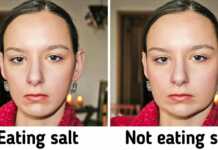We’ve become accustomed to thinking that aging is a gradual process that adds more wrinkles and tiredness to our lives, little-by-little. But the results of recent research turned out to be shocking — it’s been found that major age-related changes occur in 3 stages — at the age of 34, then at 60, and finally at 78. And it doesn’t depend on genetics or the characteristics of the body. We all go through these stages.
We at ViralSection were surprised by these discoveries and decided to find out whether this new knowledge about aging can help us and what we can do to preserve our youth and beauty for as long as possible.
Aging happens in 3 shifts.
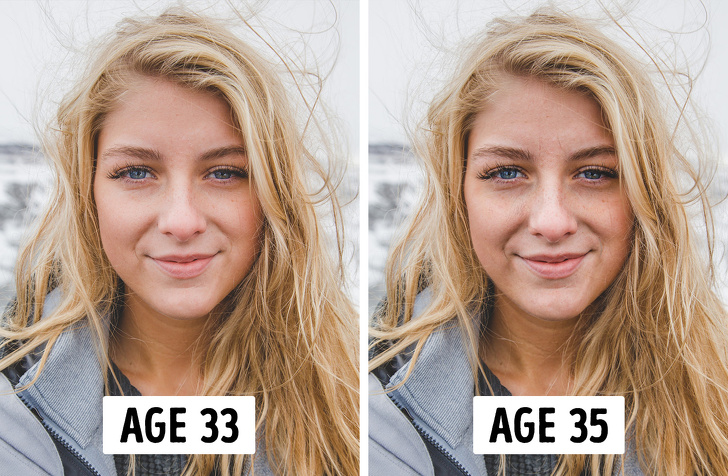
© Connor Wilkins / Unplash
Scientists studied the blood of more than 4,000 people of different ages and noticed a strange pattern: the concentration and composition of the proteins in the plasma of some participants was significantly different from the rest. These differences were noticed only in people who were 34, 60, and 78 years old.
Since the overall condition of the body directly depends on the blood quality, the researchers came to the conclusion that it’s at these ages when major aging changes take place. Earlier, scientists were sure that aging happened gradually and smoothly, however, it turned out that a person ages in 3 distinct shifts, while we don’t age that obviously during other periods.
Thanks to these results, modern healthcare could change drastically. Now, doctors will be able to evaluate the overall body condition with the help of blood tests and compare a person’s real age with their body’s actual health. For instance, if the biological age, determined by the blood test, is much lower than a patient’s real age, it means that the patient has outstanding health.
In the future, it will even be possible to find out which products or habits affect the youth of a certain person and which organs age faster than the rest. This will help to quickly identify new diseases and prolong a person’s life.
Who do “age shifts” affect more?
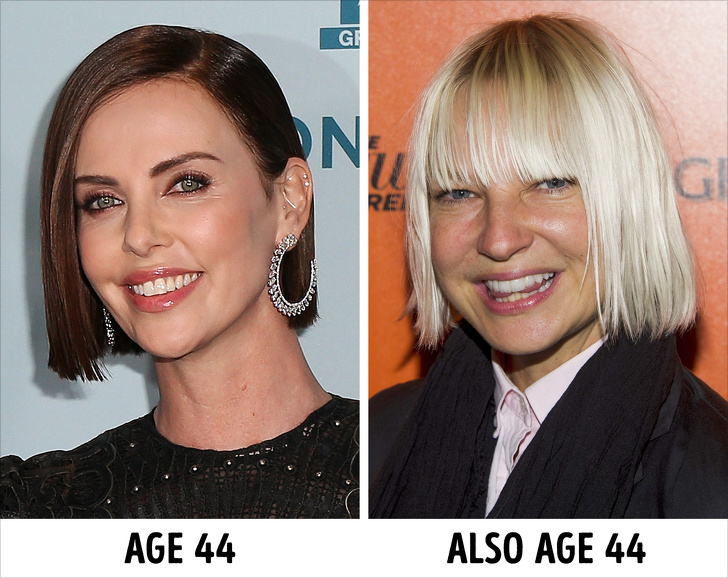
© East News
We all have to go through these shifts, but still, age changes are more obvious after the age of 34 in some people, than in others. First of all, this mostly applies to those whose parents always looked at least their age or older. It’s connected with genetics: the body’s ability to stay young and beautiful is inherited, and vice versa, we get early signs of aging from our ancestors as well.
The second risk group are people whose biological clock goes ahead of their real age. For example, 2 30-year-old people can have a totally different body condition, all because the first person is “biologically” 20 years old and the second one is “biologically” 60 years old. The reason is: the human body can get 3 years older within one calendar year and it doesn’t just apply to people with unhealthy habits. It turns out that the level of stress in childhood and even birth weight affects the inner age of each person.
The situation is exacerbated for people whose body has started to age prematurely — the 34 year age shift will affect them the most. At the same time, the signs of premature aging are not limited by the sudden appearance of wrinkles or with the skin’s loss of elasticity. Some of these signs are not even connected with the beauty of the face.
How do you know that your body is getting old prematurely?
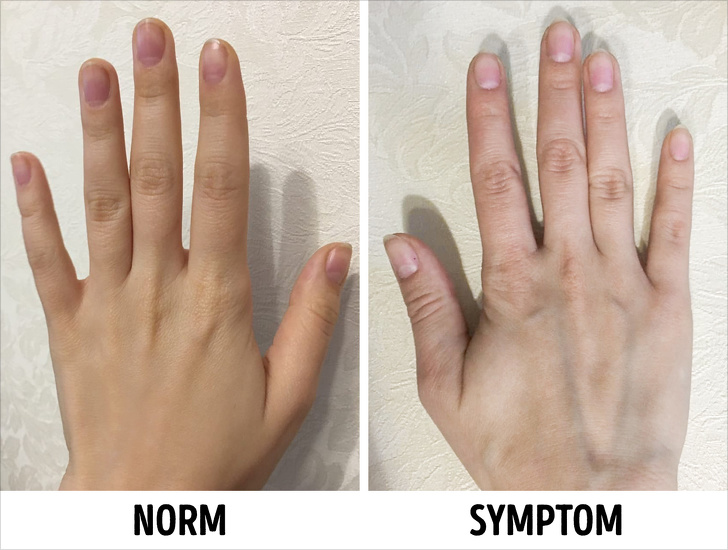
- When bruises on your skin appear, even after a slight bang, and don’t disappear for several weeks — this is a cause for concern. This skin condition is the norm after the age of 45, but having this happen at the age of 35 can indicate premature aging. The same rule applies to scratches. If the traces of a scratch from your pet’s claws don’t disappear, even after 2 weeks, this is an alarming sign.
- When the skin on your hands has become drier and thinner, and the veins show through more vividly — this is another sign of aging, which should not be happening at the age of 30, since it’s also a characteristic of advanced age. However, if you’ve always had hands like this, then there is nothing to worry about — it means that this is just a personal feature of your body.
- If it’s difficult for you to keep up with your partner when walking and you suddenly start to notice that you are always behind or your friend, who’s the same age, has to hurry you up during walks — this means that the tone of your muscles has decreased. It’s not normal for your healthy and young body to be less fit than your same-age friend, especially when you both have the same lifestyle.
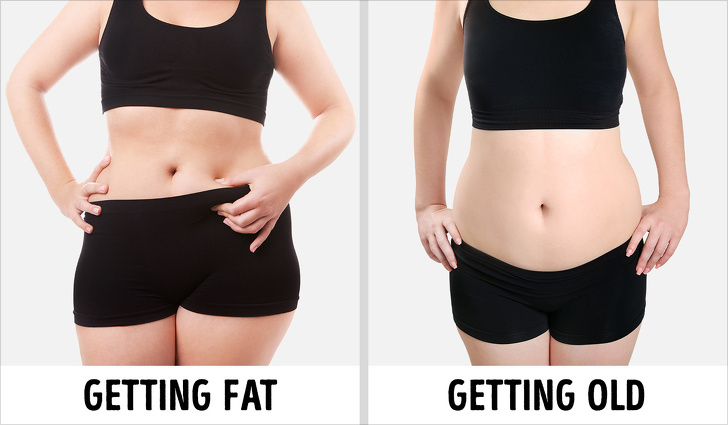
© Depositphotos
- If you find that you have extra fat, not just in your waist and belly area, but also on the back part of your shoulders — scientists and doctors say that this is one of the clear signs that the body is starting to function worse. At the same time, an even weight gain is not a sign of premature aging, but having extra fat on your body will negatively affect your youth.
- If you find that small brown spots have started to appear on your face, neck, and on your neckline, this is pigmentation — the skin’s reaction to the sunlight, which usually doesn’t start before 40 or, if it does, it appears in very small amounts. These changes happen to people who sunbathe without sunscreen and those who don’t use moisturizing creams with SPF filters in the winter.
- You find that your family has started to claim that you snore. Not only is this torture for those who sleep beside you, but it is also a sign of impending health issues: the risk of developing cardiovascular diseases increases and your blood pressure rises too.
- You have an irregular menstrual cycle (in women). This instability can speak volumes about the possibility of early menopause, which usually starts between the ages of 46 and 54. If menopause starts a little bit earlier, it means that your organs are aging faster than you are.
What to do to postpone aging?
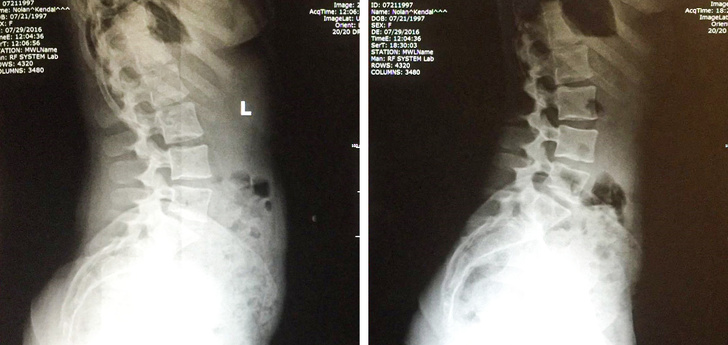
© kendal brooke / Twitter
“One month of healthy eating resulted in weight loss and a decrease the pressure on my spine.”
First of all, instead of working on the consequences, you can just take care of your body in advance. And you should do it regularly. Apart from the well-known methods of preserving youth, like playing, sports, eating healthy food, and drinking enough water, there are less obvious but still important things that should become a habit.
- Monitor the condition of your blood and the amount of protein in it. These indicators can tell you about the overall condition of your body and once you know your norm, it’s easy to track any changes.
- Track your hormonal background. This is directly connected to the speed of aging. Also, only take hormonal medications by a doctor’s prescription — the wrong pills will only worsen your condition and can even provoke weight gain.
- Stop looking at your phone with your head bent down. This is the best way to get unnecessary neck wrinkles. The same situation applies to watching TV in the evening in a horizontal position when your head is lying on a pillow that is located at a low level. Try to avoid this position at all costs.
- Wash your face after the gym. Frequent washing breaks the protective layer of the skin, however, sweat that stays on your skin after physical training causes irritation and inflammation, which can result in dryness and wrinkles in the future. That’s why it is not only important to wash your face after physical exercise, but also in the mornings, because your skin secretes oil and sweat during the night as well.
- Spend less time driving. Each driving session is a stress for your body — the levels of cortisol and adrenaline increase and it provokes both early wrinkles and general fatigue. It’s way healthier for the body to take a walk. In addition, if you spend more than one hour commuting to the office, you may want to consider changing your job for one that is located closer to your home.
Have you noticed significant aging signs that suddenly appeared in you or your friends after the age of 34? Please share the lifehacks that have helped you preserve your youth in the comments!
Preview photo credit Connor Wilkins / Unplash












